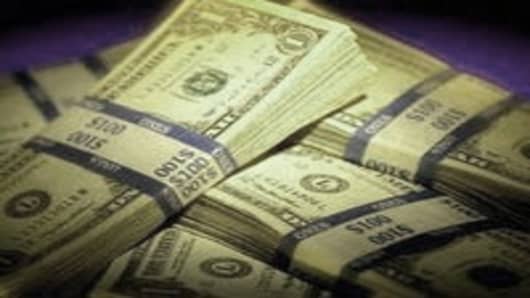That $3.7 trillion in cash still sitting on corporate America's balance sheet could be the key to whether Wall Street can sustain its dramatic five-month surge.
Even as the stock markethas gained nearly 30 percent off the October lows, companies have been slow to part with their all that money that has accrued in their coffers since the end of the financial crisis.
But with the economy stabilizingand the market on a tear, investors are beginning to look to companies now for activity that would boost their holdings — in particular stock buybacks, dividend increases or mergers and acquisitions.
"Cash is high by any measure and is a positive argument for equities," Thomas J. Lee, chief market strategist at JPMorgan Wealth Management, said in an analysis. "The top 25 companies have 50 percent of the market cap represented by cash, though several names here have a high level of debt. Relative to long-term history, the greatest cash cushions are in financials, health care, industrials and technology."
Though he expects the Standard & Poor's 500 to finish 2012 only incrementally higher from here — his full-year target is 1,430 — Lee sees companies putting at least some of that money to work, which in turn will help areas of the market.
Dividends and buybacks should amount to $250 billion this year, he projects, noting that 123 companies already have increased dividends by $20 billion. About half the dividend hike total has come from the $9.9 billion move that Apple announced recently.
Companies best poised to benefit from their ability to use their cash to boost stock price reside mostly in the technology and financial sectors. Indeed, about two-thirds of the total cash available belongs to financials, though the $1.2 trillion that nonfinancials are holding is still 60 percent higher than pre-crisis levels.
(See chart below for 25 stocks that JPMorgan thinks are good plays based on the notion that high cash levels lead to outperformance.)
One area where companies have not been spending is mergers and acquisitions.
While the pace of dealmaking is actually above 2011 levels for the first quarter, the total volume of $158 billion is off 42 percent from the first quarter a year ago and the lowest level since the third quarter of 2009, according to Dealogic.
"Companies are without question more willing to put money to work now, but there's not going to be an avalanche of money. That would be counterproductive as far as they're concerned," says Michael Cohn, chief market strategist at Global Arena Investment Management in New York. "They're not going to go from being pragmatic the last four years to just running around hiring a million people."
Another obstacle for companies putting cash to use is tax structure.
A good chunk of those trillions belongs to multinational companies reluctant to repatriate their earnings because of higher U.S. tax rates. JPMorgan has estimated the total of corporate cash overseas at nearly $1.4 trillion.
"It does limit what companies can do with the stated cash levels on their balance sheets," says Gary Flam, portfolio manager at Bel Air Investment Advisors in Los Angeles. "Apple talked very notably about share repurchases and dividend payments, but they also were cognizant of how much is in the US and how much is overseas."
Finally, while some investors may feel comfortable enough to keep buying stocks, that enthusiasm probably won't translate into corporate behavior until some lingering storm clouds disappear.
The European sovereign debt crisis has been calmed for now but will reappear in the coming months, while Federal Reserve Chairman Ben Bernanke warned Mondaythat unemployment remains a significant problem and could warrant more central bank intervention.
"I don't think managements feel that is all behind us and it's going to be smooth sailing," Flam says. "They realize we face a fiscal cliff here in the US. Europe is still uncertain, and the rate of growth in emerging markets has lately been of question as well. Given that, it only makes sense for boards to be methodical in how they invest capital."




